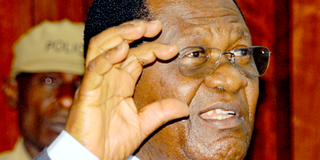Judiciary not free, says Odoki

The Chief Justice, Benjamin Odoki
What you need to know:
The Chief Justice, Benjamin Odoki, has decried the interference by the Executive arm of government on the independence of the Judiciary, noting that the intrusion has been pronounced in the State’s refusal to obey and enforce decisions of courts of law.
The Chief Justice, Benjamin Odoki, on Friday decried the interference by African governments on the independence of the Judiciary, noting that the intrusion has been pronounced in the state’s refusal to obey and enforce the decisions of courts, open attacks on them and storming of the High Court like it happened in March 2005.
Mr Odoki was speaking at the annual Southern African Chief Justices Forum in Kampala that saw a total of 11 chief justices and two deputy chief justices attending the forum.
“Most judiciary both in Africa and beyond face challenges to their independence because their independence on the paper has not been translated into real independence in practice,” said Mr Odoki.
He referred to several surveys that rank selected countries on judiciary independence by both the World Bank and the World Economic Forum, in which African countries consistently fare worst than their counterparts in the northern hemisphere.
“Although it must be said that even in developed democracies, the pressures on the Executive to respond to new threats such as terrorism, economic down turns, pressing needs to adopt a liberal or conservative approach to national issues such as abortion and control of guns have seen especially the Executive interfering with the space of the Judiciary,” said Mr Odoki.
The Chief Justice also pondered on whether the Judiciary, which is the cornerstone of the rule of law and the basis of economic growth in most countries is still a valid consideration in Africa.
“In Africa, interference in the Judiciary space has been most pronounced in the state refusing to obey and enforce decisions of the court, open attacks on the Judiciary, storming of the judiciary like it happened in Uganda in 2005, poor facilitation of the judiciary and delay to appoint judges,” Justice Odoki noted.
Challenges such as failure by the Executive to provide an adequate working environment for judicial staff, poor pay and relegating the Judiciary among the second or third best priorities of government were pointed out by Mr Odoki.
“Suffice to mention that the meager resources allocated to the Judiciary and as compared to the other organs of government only go to explain the real place of the Judiciary in Africa,” he said.
He called on African governments to prioritise the work of the Judiciary in its budgets, saying the courts can only play their role if well facilitated.
The question of the independence of the Judiciary has been a subject of public debate since November 2005, when the High Court’s premises were surrounded by armed members of the Joint Anti-Terrorist Team (JATT) also known as the ‘Black Mamba Urban Hit Squad’.
The JATT tried to re-arrest opposition leader Dr. Kizza Besigye and 22 suspected rebels with whom he was linked on the grounds of new charges before the General Court Martial. A few days after the incident, Judge Edmond Ssempa Lugayizi withdrew from the case, citing interference by the military.
Several reports on Uganda point that the independence of the Judiciary is threatened; the latest being a report by the International Bar Association’s Human Rights Institute (IBAHRI) which concludes that in political cases, the government has pressured judges, defied orders of the court and repeatedly criticised judicial decisions.
President Museveni, who was the guest of honour, warned of the dire consequences of a corrupt judiciary system and said it would be a disaster. He stressed that the Judiciary must be totally free from corruption.
“The office of the chief justice is very important and must be independent so that he can decide without bias on any matter that comes before him,” Mr Museveni said. The President also cautioned the Judiciary to desist from giving biased judgments.
Speaking about the London riots openly for the first time, Mr Museveni marveled at their judiciary working even on weekends to have those arrested during the riots charged. The Munyonyo forum that is scheduled to end tomorrow, is running under the theme of “The Office of the Chief Justice as the Custodian of Judicial Independence.”
Article 128 (1) of the Ugandan constitution states that the judiciary shall be independent and shall not be subjected to control of any person or authority.



